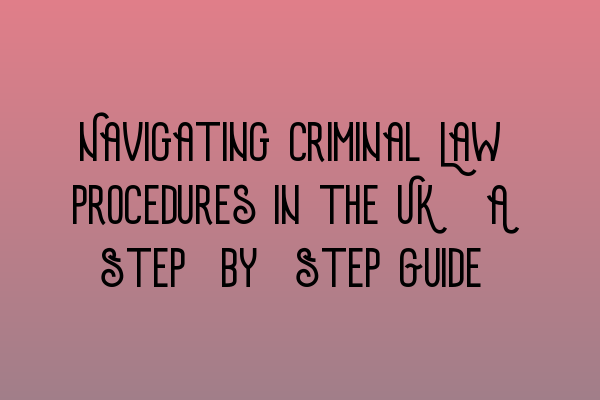Navigating Criminal Law Procedures in the UK: A Step-by-Step Guide
Welcome to the SQE Criminal Law & Practice Law UK blog. In this comprehensive guide, we will walk you through the step-by-step process of navigating criminal law procedures in the UK. Whether you are a law student preparing for the SQE exams or a practicing solicitor looking to refresh your knowledge, this guide is designed to help you understand the intricacies of the criminal law system.
Step 1: Understanding the Basics
The first step in navigating criminal law procedures is to have a solid understanding of the basics. Familiarize yourself with the main legislation, such as the Theft Act 1968, Misuse of Drugs Act 1971, and Criminal Justice Act 2003. A good place to start is our SQE 1 Preparation Courses, where you can gain valuable knowledge and practice exam questions to test your understanding of the fundamentals.
Step 2: Arrest and Detention
After understanding the foundational principles of criminal law, it’s important to know the procedures involved in arrest and detention. This step is crucial for protecting the rights of individuals involved in criminal investigations. If you’re looking for more practice, check out our SQE 1 Practice Exam Questions that cover arrest and detention scenarios.
Step 3: Investigation and Gathering Evidence
Once a person is arrested, the investigation and gathering of evidence begin. This step involves interviewing witnesses, collecting forensic evidence, and analyzing crime scenes. To enhance your understanding of these processes, consider enrolling in our SQE 2 Preparation Courses that provide comprehensive training on investigation techniques and evidence gathering.
Step 4: Charging and Court Proceedings
The next step in criminal law procedures is charging the suspect and progressing to court proceedings. This stage includes the preparation of the case, plea hearings, trials, and sentencing. For a realistic experience of court proceedings, we recommend practicing with our SQE 1 Practice Mocks FLK1 FLK2 that simulate real-court scenarios.
Step 5: Sentencing and Appeals
After a verdict is reached in court, the final step in criminal law procedures involves sentencing and, possibly, appeals. Understanding the principles of sentencing, including factors considered by the courts and the different types of sentences available, is crucial to effectively represent clients. Stay up to date with the latest SRA SQE Exam Dates to plan your preparations accordingly.
Conclusion
Navigating criminal law procedures in the UK can be complex, but with the right knowledge and preparation, you can confidently handle criminal cases. By following this step-by-step guide, engaging in practice exams, and enrolling in relevant courses, you will be well-equipped to navigate the intricacies of the criminal law system. For more information and resources, explore our website at SQE Criminal Law & Practice Law UK.
